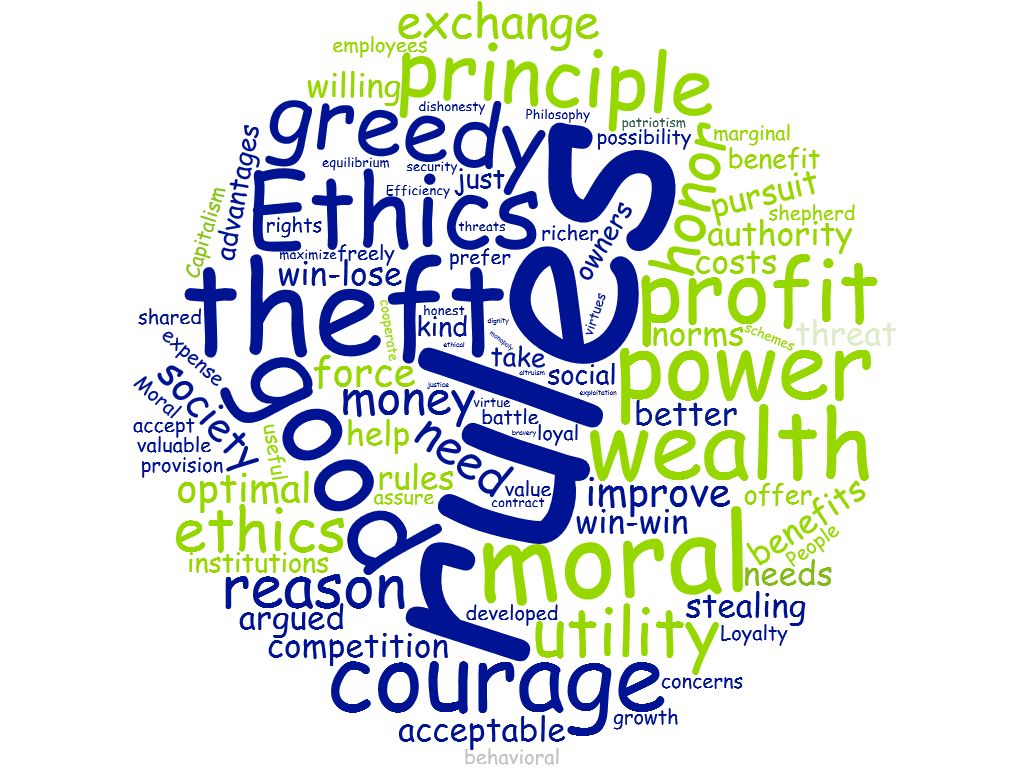THE ROLE OF PRIVATE PROPERTY IN A CAPITALIST MARKET ECONOMYThe Necessity of PropertyThe purpose of this lengthy discussion about different types of property is first to demonstrate that the acceptance of private property is pervasive in its numerous manifestations, and second, to highlight the relationship between private property and voluntary exchange. Voluntary exchange involves a transfer of ownership claims: I give something to you that is “mine” in exchange for something that is “yours.” As a result what’s mine becomes yours and what’s yours becomes mine. Voluntary exchange represents a transfer of ownership claims between two parties. More importantly, it is the ability to secure property that motivates production and exchange. For example, if I can secure the house I build, or the crop I plant, or the land I occupy, then I am more likely to build and plant and occupy. I will seek out the most fertile land I can find, with the best resources. I will produce so that I may consume some portion and so I can trade the surplus for other products that I value more. Others will be inspired to do the same, facilitating the division of labor and a multitude of exchanges, all of which raise the community’s surplus value and total happiness. If property could not be secured, then producers would fear the expropriation of the fruit of their hard work, thereby discouraging these efforts. Even socially constructed property can be exchanged in a market. For example consider the acquisition of tickets for a popular musical event in which tickets go on sale at a particular date and time and are sold on a first-come basis. Sometimes this results in long lines that can form hours or days before the ticket window opens revealing a strong market preference for the event at the standard prices. If someone acquires a ticket to the event after waiting for hours in line, he could either use the ticket himself, or sell the ticket to someone else, who did not wait in line, for a much higher price. In this way acquiring property, using the production process of waiting, can result in profit for several parties. Astute market observers are always in search of valuable property that can be transformed into mutual gains. But there is nothing necessarily devious in the desire to acquire property for the sake of personal profit, since the outcome from voluntary exchange always results in mutual benefits. Indeed, Adam Smith’s discussion of man’s propensity to truck, barter and exchange describes individuals who can acquire objects in places where their value is low and ‘truck’ them to places where their value is higher. In a similar way, land and capital property is acquired because an appropriate combination of resources can produce output that is desirable in trade. One other way to understand the importance of property is to engage in the counterfactual: namely what would the world be like if there were no property? Without property how would voluntary exchange work? I give something to you that isn’t mine for something from you that isn’t yours? Wouldn’t no property mean anyone could just take anything from someone else? After all, in a world with no ownership, no one could claim something as her own. They might possess something momentarily but there could be no objection if someone else claims possession. Or, would no possessions only come about in a world without desire? If no one cared to possess anything then there would be no desire for property. Without property there would be no reason for voluntary exchange. And since voluntary exchange creates surplus value, the absence of voluntary exchange means no extra happiness bursts. Also, without the benefits from voluntary exchange there would be no desire to divide labor into specialties. The ultimate result may be an economy that relies exclusively on self-production. This would not be a world of prosperity but more likely one of abject poverty. Private property is one of three pillars that support the economic system; the other two being the division of labor and voluntary exchange. These three features are absolutely necessary in establishing the high standard of living that the world has achieved today. Steven Suranovic, April 26, 2020 Additional Readings about Property |
INTERESTING ASIDESAlternative Views
Jonn Lennon - ImagineJean Jacques Rousseau"The first man who, having fenced in a piece of land, said 'This is mine', and found people naive enough to believe him, that man was the true founder of civil society. From how many crimes, wars, and murders, from how many horrors and misfortunes might not any one have saved mankind, by pulling up the stakes, or filling up the ditch, and crying to his fellows: Beware of listening to this impostor; you are undone if you once forget that the fruits of the earth belong to us all, and the earth itself to nobody." Theory of Human Nature, 1754. This Land is Your Land - Woody GuthrieThe original version of this song had a verse suggesting the impropriety of private property. The verse was revisited in this version by Pete Seeger along with several other verses pertaining to property rights. |

The Ethical Economics
Study Center